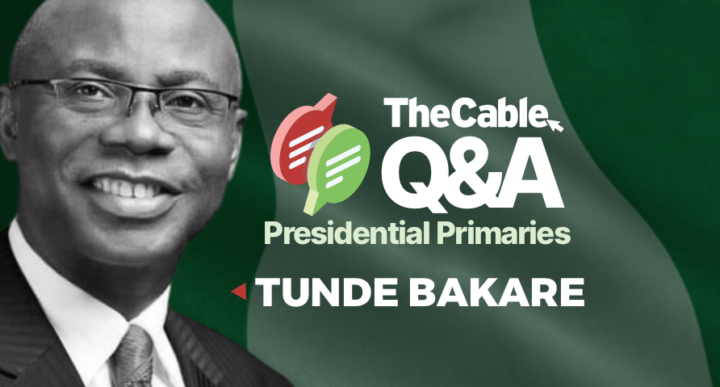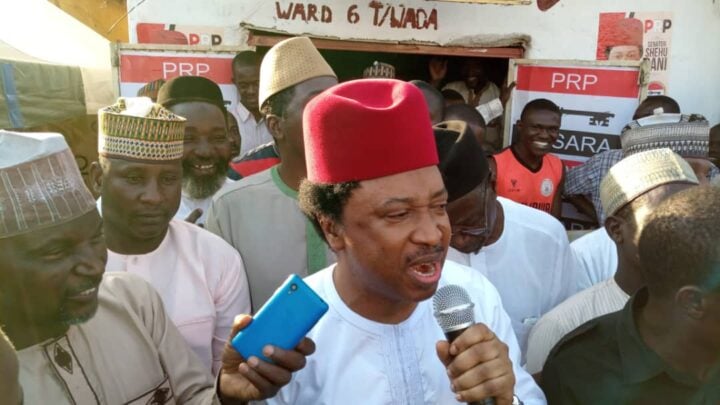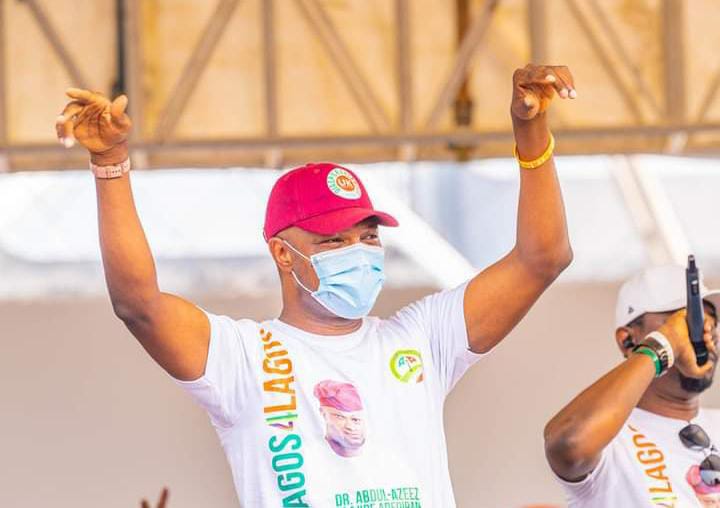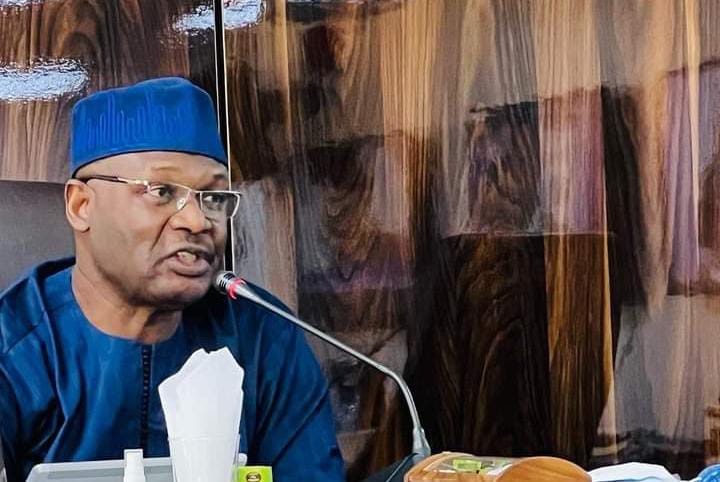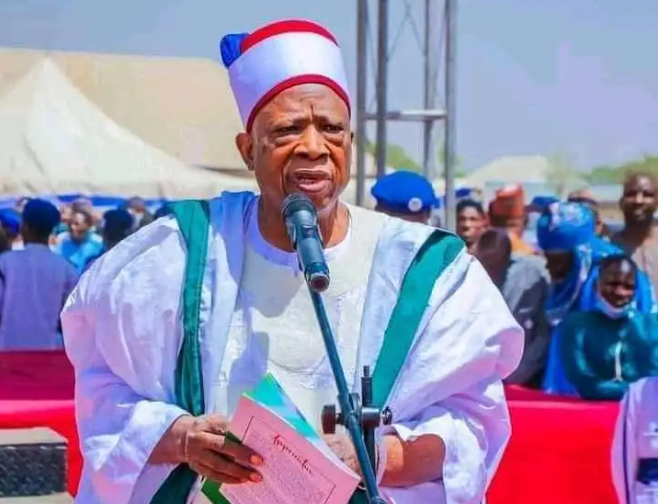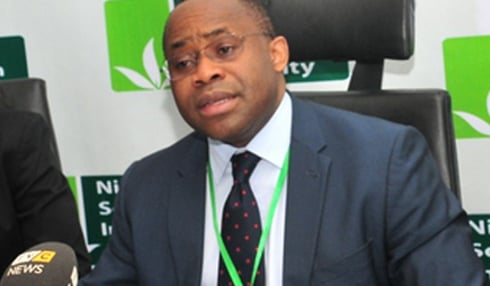As Nigeria’s two biggest parties hold special conventions to pick their presidential flag bearer this weekend, TheCable poses the same questions to a number of contenders on their agenda for Nigeria. Tunde Bakare, pastor, former vice-presidential candidate and APC presidential hopeful, speaks on his plans…
One of the biggest issues in Nigeria today is insecurity. How would you tackle the multifarious menace of insurgency, banditry, terrorism and kidnapping?
I must first express my deepest condolences to every Nigerian who has lost a loved one to insecurity and violence in their manifold forms. I also empathise with communities across our nation who live under the constant threat of invasion by insurgents, bandits or terrorists, as well as fellow Nigerians across the nation who are currently being held captive by kidnappers. I feel a sense of responsibility to these Nigerians as well as their families and communities and I would like them to know that they are among the reasons I am running for president: I am running to ensure that they live in a safe and secure Nigeria. Let me also commend the men and women of the Nigerian Armed Forces (NAF) and the various law enforcement agencies who daily lay down their lives for the protection of Nigerians and the defence of our territory. I also acknowledge the efforts of the current government led by President Muhammadu Buhari, including, most notably, the deployment of A-29 Super Tucano aircraft that have been acquired from the United States of America towards the fight against Boko Haram or the Islamic State West Africa Province (ISWAP). Also commendable is the recent $1 billion arms deal with the United States of America.
My plan to guarantee “A New Nigeria for Every Nigerian” is hinged on four pillars or mandates, namely the 4 Ps of Peace, Progress, Prosperity and Possibilities. Our national security agenda falls under the Peace mandate. On October 6, 2019, in a State of the Nation address titled “Resetting Nigeria on the Path of Predictable Progress,” I presented a national security audit that identified seven threats to Nigeria’s national security, including politically motivated threats, economically motivated threats, ideologically motivated threats and ethnic nationalistic threats. Others include zonal security threats, threats by state actors, and strategic threats by foreign actors. All these factors have cumulatively heightened our vulnerabilities as a nation.
Advertisement
Furthermore, I identified the factors inhibiting current attempts at addressing insecurity, including multilevel unpreparedness for national security. In this regard, due to the absence of zonally targeted security structures and operations, a zonal security vacuum has been created and exploited by zonal non-state actors such as Boko Haram or ISWAP in the north-east, bandits, cattle rustlers and terrorist elements in the north-west, criminal elements taking advantage of the herder-farmer conflicts to invade and sack hapless communities in the north-central, militants and oil thieves in the south-south, and sectional agitators in the south-west and south-east. At the root of our multilevel unpreparedness for security threats is the absence of subnational policing systems, especially state and local police. The structural and numerical inadequacies of our policing system have led to an overstretching of the Nigerian Army and heightened our vulnerability in the face of external aggressors. In essence, Nigeria needs a new national security architecture.
If I am elected president, as commander-in-chief of the armed forces, I will rebuild our national security architecture on the foundation of a new philosophy that brings the national security apparatus closer to the people. My national security philosophy will accord the security of the cattle owner in Gusau, the farmer in Makurdi, and the trader in Onitsha the same importance as the security of the president.
Central among a wide range of actions which are outlined in my plan for a new national security architecture is the coordination and non-politicisation of intelligence. Hence, the new national security architecture will see to the coordination of our intelligence agencies through an independent non-political Office of the Director of National Intelligence (ODNI).
Advertisement
The ODNI will work directly with national and subnational level security agencies to take prompt action on intelligence, while the National Security Adviser (NSA) will focus on advising me as president based on my administration’s security agenda and intelligence made available to me by the ODNI. This will facilitate efficiency, remove many of the hurdles on the path to our national security, and save countless Nigerian lives.
In addition, the Nigeria Police Force (NPF) will be reconstituted into an intelligence-driven National Bureau of Investigation (NBI) with federal jurisdiction. Furthermore, state governors will be constitutionally empowered to fulfil their roles as Chief Security Officers of their respective states. Hence, the federal security architecture will be complemented by state policing systems with the capacity to form inter-state zonal commissions which will collaborate with the NBI to address security threats from the respective geopolitical zones. We will make subnational policing work smoothly in Nigeria through constitutional provisions aimed at preventing excesses and protecting minority populations within the states.
Also integral to our national security agenda is our plan to fully equip our military and law enforcement agents. Therefore, in addition to leveraging our foreign policy thrust to facilitate favourable arms deals, my administration will invest significantly in the Defence Industries Corporation of Nigeria (DICON) to strengthen domestic capabilities in defence production. We will also invest in surveillance technologies, deploy border sensors and drones, and harness the National Identification Number (NIN) system to prevent and detect threats to national security. These kinetic measures will be supplemented by non-kinetic strategies aimed at dealing with the root causes of insecurity such as poverty and unemployment.
The economy is in a terrible situation with debts piling up, oil revenue dropping and prices of goods and services hitting the roof. What measures you would take to redress the crises?
Advertisement
My agenda for the Nigerian economy rests largely on the Prosperity pillar of my plan. Nigeria is a potentially wealthy and prosperous nation but we are currently caught in a web of paradoxes. For instance, although Nigeria remains the largest economy in Africa with a total Gross Domestic Product (GDP) of around $432 billion, the per capita GDP is just about $2,097 which does not compare favourably even with Ghana, our West African neighbour. The implication of this is that the Nigerian economy does not generate sufficient wealth for the Nigerian people. In the past six years, Nigeria has tackled two recessions: one triggered by a fall in oil prices at the start of the Buhari administration and the other triggered by the COVID-19 pandemic. While our economy has exited recession, recovery has been slow and the Nigerian people and businesses continue to bear the brunt of the economic downturn.
The core weaknesses of Nigeria’s economy are in two dimensions, namely structural and spatial. The structural dimension of our economic challenge relates to the low rate of diversification, especially as regards the capacity of the non-oil sectors to generate income. Since the oil boom in the 1970s, Nigeria has been a rentier state that is heavily reliant on commodities, especially crude oil. The spatial dimension of the Nigerian economic challenge is closely linked to the structural. Our over-reliance on crude oil has led to a situation in which much of our national wealth is derived from a single zone of the country, whereas the vast economic opportunities of the other zones have been left untapped.
The outcome of this structural and spatial defect is low productivity and the neglect of the real sector, especially manufacturing. The low productivity is, in tum, responsible for the mounting public debt which the debt management office put at close to N40 trillion as of 2021.vOur productivity deficit is also responsible for the reliance on importation, our balance of payments deficit, and the resultant hike in prices. Our fiscal and monetary policies have continued to be undermined by our overreliance on crude oil prices.
If I am elected president, I will unleash Nigeria’s diverse economic potential which is spread across her geo-economic zones. This is why, on the first day of my administration, I will launch the Nigerian Geoeconomic Development Plan (N GDP). As I said in my declaration speech, the N-GDP is a new approach to GDP and it could very well be referred to as The New GDP. With this plan, we will achieve a sustained double-digit growth rate that will triple Nigeria’s GDP and place Nigeria among the top 16 economies in the world by 2030 with a GDP of $1.5 trillion. It is noteworthy that Indonesia, which is currently the 16th largest economy in the world with a GDP of$ 1.06 trillion, was at the same income level as Nigeria in the 1960s and is often referenced as a pointer to Nigeria’s failures over the past decades. We will change this narrative with our “New GDP” agenda.
Advertisement
With our N-GDP, we will activate the industrial potential of Nigeria using the hub-and-spoke model of industrialisation, which will see the emergence of industrial cities in each geoeconomic zone made of several industrial clusters.
These clusters will, in tum, be linked to feeder hubs and enterprise zones in the respective zones. This strategy will unleash the Nigerian economy in diverse sectors, including solid minerals, agriculture, manufacturing, and SMEs.
Advertisement
On Nigeria’s rising debt profile, let me point out that debt in itself is not a problem – some of the world’s leading economies finance their growth through debt. The problem is with the economic viability of debt. However, even though, going by the latest available official data, Nigeria has a debt to-GDP ratio of 22.47 per cent, which is lower than the World Bank’s recommended limit of 55 per cent, we will rely less on debt in financing our economic plan because we do not want to keep piling on debts for subsequent generations to repay. We will engage the private sector more using such instruments as public-private partnerships (PPPs) to finance infrastructural development. We have set an objective to attract $2.5 trillion worth of foreign and domestic direct investment into the Nigerian economy in 10 years. To achieve this goal, as president, I will be the Marketer-in-Chief of Nigeria’s economic potential and I will take on the role of aggressively and creatively marketing the economic possibilities of the Nigerian Geoeconomic Development Plan (N-GDP).
Youth unemployment is one of the biggest challenges facing Nigeria today. What plans do you have to address the situation?
Advertisement
Data from the National Bureau of Statistics (NBS) puts the youth unemployment rate in Nigeria at 42.5 per cent. This is a significant problem given that about 64 million Nigerians were placed in the 15-35 age band in the 2012 National Youth Baseline Survey. Youth unemployment is a cross-cutting issue with dimensions in each of the four pillars of my plan. First, it is a Peace issue. The failure to integrate the younger generation into the governance equation has kept the issues that pertain to them on the back-burner. It has also prevented us from harnessing the ideas of our young people in tackling complex and evolving problems like unemployment. This has further aggravated the feeling among our youth that society has failed them. Consequently, the aggrieved youth seem to have no stake in the Nigerian nation and are ready to ‘japa.’ As the saying goes, idle hands are the devil’s workshop. Hence, in extreme cases, some have taken to nefarious activities like cybercrime or the ‘Yahoo Boy’ syndrome, or even ritual killings, while some are readily available for deployment in robbery, banditry and terrorism. This is why we need a holistic approach to dealing with youth unemployment.
Youth unemployment is also a Progress issue. Our party, the All Progressives Congress (APC), is known for its progressive ideology. Progressivism prioritises equity, justice and inclusiveness in access to opportunities, including educational opportunities. Consider the dwindling quality of our public education system which serves the so-called ‘average Nigerian’ whose parents cannot afford the expensive private institutions or the cost of foreign education. Due to this comparative disadvantage in access to opportunities, the quality of graduates from our educational institutions has come into question with the Nigerian graduate often described as unemployable.
Advertisement
Youth unemployment is also a Prosperity issue because the high unemployment rate is the result of our inability to unleash the wealth creation potential of the Nigerian economy through the right mix of fiscal and monetary policies. Finally, it is also a Possibilities issue; for Nigeria to leapfrog into the fourth industrial revolution with Science, Technology and Innovation as key drivers, and for us to activate the possibilities of our Arts, Culture, Entertainment, Tourism and Sports (ACETS), we must discover, develop and deploy the enormous potential of Nigerian youth.
This is why, in my plan, I see Nigerian youth as leaders, competent stakeholders in the Nigerian commonwealth, wealth creators, and creative innovators. Consequently, as president, I will restore to Nigerian youth confidence in their country. I will begin by ensuring the representation of youth in governance through the Presidential Young Leaders’ Programme (PYLP), which will attract, train, mentor, appoint and back young Nigerian men and women to run for office in line with the Not Too Young To Run Act. This will provide an opportunity for us as a nation to harness the ideas, intellect and creativity of our young people in solving problems like unemployment and also in repositioning us to fully explore the possibilities of the 21st century. In the course of my trajectory as a nation builder, I have co-created incredible solutions with young people. This experience is what I will bring to the presidency. My administration will not make policies for Nigerian youth; my administration will make and implement policies with Nigerian youth.
To enhance the competence of our young workforce, our Educate to Industrialise Nigeria (EIN) agenda will cater to academic as well as technical and vocational pathways to ensure equitable access to skilling and upskilling opportunities. The EIN will see a productive linkage between academia and the industrial clusters in each geoeconomic zone. As a result, the output of our academic, technical and vocational institutions will be graduates who are equipped with degrees and diplomas for predictable pipelines of jobs and also with actionable and fundable business plans should they opt for an entrepreneurial pathway. Our EIN will ensure that the output of Nigeria’s public institutions can compete favourably with graduates from the leading schools in the world.
Furthermore, in line with our “New GDP” agenda, we will tum our local government areas into local enterprise zones feeding adjacent industrial clusters. We will facilitate the business ideas of our young people by setting up enterprise bureaus in each enterprise zone to assist them in market intelligence, access to funds, and linkage to industries. Through each enterprise bureau, endowment funds will be disbursed to facilitate businesses in the respective local enterprise zones. We will give particular attention to ideas in the field of technological innovation and the Arts, Culture, Entertainment, Tourism and Sports (ACETS) clusters to tum our ACETS into our assets. In addition to highly-skilled jobs, the enterprise bureaus will also target local artisans and technicians for enterprise capacity building and business facilitation, thereby creating millions of jobs across the nation.
Petrol subsidy is projected to gulp N4 trillion in the 2022 fiscal year. What would be your own policy choice on pricing?
Subsidies are instruments by which governments seek to cushion the effects of rising prices for their populace. However, over the years, the fuel subsidy in Nigeria has become a symbol of inefficiency and mismanagement. In 2012, under my leadership, the Save Nigeria Group (SNG) mobilised Nigerians to protest the mismanagement of the fuel subsidy regime. In my daily addresses to the Nigerian people during those protests, including the one titled “The Simple Arithmetic of Oil Subsidy,” I showed that corruption was the major challenge confronting the subsidy regime. At that time, we rallied around the core message, “Kill Corruption, Not Nigerians.”
That being said, it is a well-known economic fact that subsidising consumption creates market inefficiencies and stifles the competitiveness of a sector. For Nigeria, no other sector demonstrates our economic paradox like the petroleum sector. As an oil-producing country, where we should be benefiting from global surges in crude oil prices, our situation is the opposite. When crude oil prices go up, Nigerians queue up. Filling stations are lined with fuel queues because our refineries are not working despite the substantial allocations to turnaround maintenance.
It is to the credit of President Muhammadu Buhari that the building of three of Nigeria’s refineries happened during his tenure as federal commissioner for petroleum and natural resources under a military administration over four decades ago. It is also to his credit that the Petroleum Industry Act (PIA) has finally been passed after years of delay.
If I am elected president, we will deploy the right mix of policies towards achieving progress and prosperity with our petroleum resources. My first focus in this regard will be to make domestic refining work optimally. With the Dangote Refinery expected to produce 50 million litres of petrol and 15 million litres of diesel daily, Nigeria’s daily consumption of petroleum products will be met through domestic production. This will eliminate import dependency and position Nigeria to benefit from global surges in crude oil prices. It simply shows the need to reform the sector for competitive private sector participation. Consequently, I will engage the National Assembly towards further amendments to the Petroleum Industry Act (PIA) to allow for a public-private partnership approach to the resuscitation of our refineries through concessions or outright sales, leveraging appropriate institutions such as the Bureau of Public Enterprises (BPE) and the Infrastructure Concession Regulatory Commission (ICRC). I will also engage state governments to work out modalities for building and maintaining modem modular refineries, especially in oil-bearing communities.
While these reforms are ongoing towards domestic refining and the optimisation of the full value chain of petroleum resources, I will adopt a transparent and phased removal of the fuel subsidy alongside targeted safety nets such that Nigerians will not feel the effect of subsidy removal. In about two years, Nigeria will be a net exporter of refined petroleum products and the price of fuel will significantly reduce. Nigerians will begin to truly enjoy the benefits of being citizens of an oil-producing country and fuel queues will be a thing of the past.
Despite trillions of naira spent on the power sector, we are still not out of darkness. What are we not getting right and how you would tackle the issues?
The power sector is another area that has yielded minimal returns on investments as the reforms that have resulted in the current structure of the sector have not delivered on the promise since 2005. As a result, data from the World Bank indicates that up to 85 million Nigerians lack access to grid electricity, while those who have access experience frequent power cuts. Recently, the repeated collapse of the national grid plunged the nation into darkness with homes and businesses bearing the brunt.
The problem of the sector cuts across the entire value chain from generation to transmission to distribution. Experts have suggested that Nigeria needs up to 180,000 megawatts of electricity to guarantee stable power supply. However, according to the Medium-Term National Development Plan (MTNDP) 2021-2025, although Nigeria has a total installed capacity of 13,400MW, our operational capacity hovers around 7,000MW, while less than 4,000MW gets to the end users. As a result, Nigerians have resorted to the widespread use of generators. Paradoxically, the total capacity of individual generating sets in Nigeria is between 8,000MW and 13,000MW- about the same as the national generation capacity. In essence, despite the efforts of previous governments, the lingering challenges of the power sector over the decades have compelled Nigerians to become their own governments. I believe we can harness our collective resolve as Nigerians to put an end to this.
As president, I will approach power sector reforms from a multi-fold perspective, starting with a review of the structure of the sector, as well as a reassessment of the respective capacities of the current players in the sector. We will then embark on the integration and consolidation of the entire value chain to allow for substantial private sector investments. The reforms will be further facilitated by decentralisation to allow for competitive subnational investments and a broadening of the national energy mix to harness geoeconomic comparative advantages in energy generation, including solar, hydro, nuclear, thermal, natural gas, biomass, wind and other energy sources. Our decentralised, private sector-driven electricity reform agenda will see the generation of up to 100,000 megawatts of on-grid and off-grid electricity by 2030 as part of our “New GDP” agenda, thus laying the infrastructural foundation for our Prosperity mandate. As I said in my declaration speech, “Parts of the world are light years ahead of Nigeria; there must at the very least be light in Nigeria.”19 With our reforms, future generations of Nigerians will only learn of the phrase “Up NEPA!” in history books and documentaries.
ASUU strikes have been part of the annual national calendar for decades. How would you address the perennial issues once and for all?
I empathise with Nigerian students who have borne the repercussions of the rifts between the Academic Staff Union of Universities (ASUU) and the federal government over the years. Even though my generation experienced school closures that created uncertainties, especially for self sponsored students like me, by and large, my generation benefitted from a more stable educational system but failed to bequeath the same to this generation. This, again, is why I am running for president: to be a bridge between the past, present and future of Nigeria, and to restore to Nigerian youth dignity and pride in their nation.
Education is a central component of the Progress pillar of my plan and, if I am elected president, my administration will permanently deal with the ASUU question in four ways. First, there is the need to uphold labour agreements. This brings to the fore the 2009 agreement between the federal government and ASUU, as well as the compromises from ongoing negotiations regarding structure and review of remuneration as well as earned allowances. My administration will respect these agreements because government is a continuum.
Second, there is the question of university autonomy. The disagreement as to the appropriate channel of payment of lecturers’ remuneration between the Integrated Payroll and Personnel Information System (IPPIS) and the University Transparency Accountability Solution (UTAS) borders on the question of autonomy. My administration will back university autonomy while ensuring accountability, transparency and probity.
The third dimension of the ASUU question is that of funding the universities. My administration will approach the funding question in two ways. First of all, there is the statutory function of the government to fund tertiary education. The government does this through the annual Appropriation Act or budget, as well as through such schemes as the Tertiary Education Trust Fund (TETFUND) which came to be as a result of the Education Tax Decree 1993.
My administration will prioritise this statutory obligation of funding tertiary education. However, public spending will be just one aspect of my funding strategy for the education sector. Our Educate to Industrialise Nigeria (EIN) agenda hinged on partnering with industries will significantly supplement public funding. It will boost research, attract funds to our universities and polytechnics, and ensure that our students are equipped for the opportunities of the 21st century.
Finally, there is a resource utilisation dimension of the ASUU question. I am convinced that Nigeria has not maximally utilised the problem-solving potential of its universities, polytechnics and other tertiary institutions. If I am elected president, there will be significant collaboration between the ivory tower and the policy round table. Rather than channel monies to foreign consultants in our quest for solutions to our local problems, from insecurity to poverty, hunger, corruption and disease, we will set up a highly competitive endowment fund to challenge Nigerian tertiary institutions to design implementable solutions to our myriad problems. Doctoral theses will no longer be forgotten on bookshelves; instead, they will be integrated into the policy agenda and deployed to solve our problems. By utilising our tertiary institutions as solution partners in governance and development, it would be unthinkable not to prioritise these institutions in public spending.
Nigeria has a very worrisome number of out-of-school children. What is the way out?
A recent report by the United Nations Children’s Fund (UNICEF) puts the number of out-of-school children in Nigeria at 18.5 million. This is alarming and unacceptable. Not only are the destinies of 18.5 million Nigerians hanging in the balance, but we also have an army of disadvantaged youth waiting to be lured into crime, banditry and terrorism. We will deal with this problem in four ways.
First, there is the access angle. Tackling this problem is crucial to the Progress pillar of my plan to guarantee “A New Nigeria for Every Nigerian;” a Nigeria where no child is left without access to education. To deal with the access problem, we will mandate every state in the federation to deploy the counterpart funding opportunity provided by the Universal Basic Education (UBE) intervention fund to revamp primary education and provide free education for every Nigerian child. But for the free education policy of Chief Obafemi Awolowo, I would not have accessed primary education. This is why I am committed to giving every Nigerian child the same opportunity.
Second, we will deal with the problem from a design angle. The northern part of our nation has the highest number of out-of-school children in Nigeria. There is a cultural dimension to this deficit in education enrolment. We will engage cultural stakeholders in the design of the educational system so that it will reflect cultural nuances and will be appealing to such groups as almajiris and nomads while achieving goals of national and universal relevance. Education will no longer be seen as ‘Western’ and foreign; it will be glocal – that is, locally designed and globally relevant.
Third, we will deal with this problem from the communication angle. In addition to such incentives as the school feeding programme which the current administration introduced, we will engage the same cultural stakeholders in the creative communication of the imperatives of education to foster a positive orientation towards school enrollment.
Finally, the out-of-school syndrome is also integral to the Peace pillar of my plan. Hence, we will deal with the problem also from a security and safety angle, because the worsening security situation in northern Nigeria contributes significantly to the rise in the number of out-of-school children. Protecting our schools will be a critical aspect of our plan to secure Nigeria.
Waste and corruption remain endemic in Nigeria. What would be your own strategy to tackle them?
Public waste impedes the creation of public wealth. Central to the problem of waste is governance structure loopholes. We cannot build a prosperous nation on the foundation of an inefficient governance structure.
The current government under President Muhammadu Buhari has begun the process of reducing the recurrent-to-capital expenditure ratio and has succeeded in plugging loopholes through such schemes as the Treasury Single Account (TSA). The next step to facilitating efficiency and significantly cutting costs requires reforms in the structure of governance. This is a step I am willing to take to build on the legacy of President Muhammadu Buhari. I will implement public sector reforms towards efficient and effective Ministries, Departments and Agencies (MDAs) by revisiting existing reports and recommendations on the rationalisation of governance structures. I will also provide political leadership towards a pragmatic approach to governance structure reforms in line with the Constitution of the Federal Republic of Nigeria 1999 (as amended), to decentralise governance and devolve powers to the subnational levels of government.
Corruption and violence are two sides of the same coin.
When corruption is dealt with and resources are equitably distributed, violent agitations will significantly reduce. This is why a strong anti-corruption stance is an integral aspect of the Peace pillar of my plan. The best way to prove that a stick is crooked is to place a straight one beside it. Therefore, I will deploy the power of personal example by modelling an anti corruption value system as president. I will publicly declare my assets and mandate the same for every member of my cabinet and every appointee of my administration. We will then proceed to sponsor legislation to make the public declaration of assets constitutional. If elected, my government will strengthen anti-corruption institutions by consolidating the Economic and Financial Crimes Commission (EFCC) into the proposed National Bureau of Investigation (NBI) and allowing the new institution the freedom to conduct its operations without political inference.
Public healthcare in Nigeria is a shambles and only the elite can afford good care. What would you do differently to change the story?
Almost like education which is also part of the Progress pillar of my plan, there are at least three main dimensions to Nigeria’s healthcare challenge. These are the access challenge, the quality challenge, and the human capital challenge.
One report indicates that nearly 80% of Nigerians do not have health insurance; another suggests the reality is closer to over 90%. In any case, while the middle and upper class may be able to pay for healthcare out of pocket in some instances, for the so-called ‘average Nigerian,’ a moderate illness could translate into a death sentence. There are also communities across Nigeria without health facilities or functional primary health centres. These are access-related issues.
Even when the access need is met, the quality question comes to the fore. The state of public hospitals across the country, therefore, calls for intervention. The access challenge and the quality challenge are responsible for such alarming indicators as Nigeria’s high child and maternal mortality rates. For instance, a recent UNICEF report indicates that Nigeria accounts for I 0% of global pregnancy-related deaths. Meanwhile, The Lancet projects that 837,639 deaths can be averted by 2030 if we achieve universal coverage and improve the quality of healthcare. These are not just numbers; these are Nigerian fathers, mothers, sons and daughters. This is a challenge that we must rise to meet.
Building on the National Health Insurance Authority Bill 2022 recently signed into law by President Muhammadu Buhari, we will make incremental progressive strides towards universal coverage by 2030.
The human capital challenge in our healthcare system is exemplified by the alarming rate at which we have been losing our trained doctors and nurses to other countries. This is notwithstanding the fact that we are already grappling with a significant deficit as there are reportedly about 4 doctors to 10,000 patients or one doctor to 2,500 patients in Nigeria. Experts have warned that at the rate at which we are losing our professionals, Nigeria could suffer a shortfall of 50,120 doctors and 137,859 nurses by 2030.
If I am elected president, we will address the access challenge by broadening the National Health Insurance (NHI) scheme towards 60% coverage by 2027 and universal coverage by 2030. In addition, while working with state governments to expand the scope of primary and secondary healthcare facilities, we will launch a National Mobile Clinic Programme (NMCP) to ensure access to healthcare for Nigerians living in remote areas nationwide.
In the medium term, we will address the quality and human capital gaps in the healthcare sector by establishing a medical city with health industry clusters in each geopolitical zone.
These medical cities will be linked to adjacent tertiary, secondary and primary healthcare centres through technology and transportation infrastructure. They will run on a social business model such that the primary school teacher in a remote Nigerian village can access the same quality of healthcare currently accessible only to those who can afford to travel to cities like Dubai. Our state-of-the-art medical cities will also provide incentives for our doctors and nurses to practice in Nigeria and for others who have left to return.
What would you do in practical terms to address the agitation for Biafra?
As a delegate to the 2014 Centenary National Conference, I proposed “The Nigerian Charter for National Reconciliation and Reintegration.” The charter was unanimously adopted by delegates from every part of Nigeria as the basis of our union as a nation. The first article of the charter reads: “We hereby firmly and solemnly resolve to live in unity and harmony as one indivisible and indissoluble sovereign nation under God.”
The charter was based on the acknowledgement that there are historical grievances and that truth and reconciliation must be the basis of national integration and nation-building. Ongoing agitations have political and economic ramifications. The agitation for Biafra is a reminder of this fact. We were confronted with some of these issues at the 2014 National Conference. For instance, while the need for efficiency as well as economies of scale and scope do not lend credence to the agitation for the creation of additional states, we cannot ignore the fact that, in a nation whose economy is buoyed by resource sharing and allocation, the South East, with the fewest states in Nigeria’s geopolitical equation, receives the least allocation and is therefore disadvantaged.
Moreover, with our current governance structure and the limited power of subnationals to harness their respective geoeconomic advantages, poverty and unemployment have translated to youth restiveness. This, added to the lingering memories of the Nigerian Civil War, has been the underlying basis for some of the agitations in the South East. The current framework of our nationhood has led to similar agitations for inclusion across the nation, including in the North East, the North West, the North Central, the South West, and the South South. These cries for inclusion are mostly heard among the underrepresented and marginalised in each geopolitical zone.
This is why a major agenda in the Peace pillar of our plan is to establish the Presidential Commission for National Reconciliation, Reintegration and Rebirth with a Board of Trustees comprised of three eminent Nigerians from each of our six geopolitical zones, including traditional monarchs, former heads of state, religious leaders, as well as statesmen and stateswomen. This Commission will be mandated to, within the first hundred days of my administration, engage every aggrieved group in Nigeria, including and especially the agitators for Biafra, and secure their commitment to dialogue for reconciliation and true nationhood. Then, within two years, the Commission will acknowledge and reconcile every past and current national and subnational group grievance. While this is ongoing, I, as president, will send reconciliatory signals that will give further assurance to the aggrieved groups and facilitate the process of reconciling and reintegrating our diverse groups into true nationhood. As I said in my declaration speech while unveiling the Peace pillar of our plan, “Peace will not just be a word on our Coat of Arms; it will become the Nigerian reality.”
Sections of the country are campaigning for restructuring, particularly in the sharing of oil revenue and the political set-up of the country. How would you handle these agitations?
The word ‘restructuring’ has been used and misused in diverse contexts. In an October 1, 2017, State of the Nation Address titled “Pragmatic Steps Towards Restructuring Nigeria,” I identified ten schools of thought around the question of restructuring.29 I do not subscribe to any school of thought that suggests the dismemberment of Nigeria. All my life, I have lived and worked for a united Nigeria that harnesses our diverse strengths into building one great Nigeria, and I am committed to a New Nigeria that works for every Nigerian; a Nigeria where every Nigerian, whether from the North, South, East or West, will be proud to call themselves Nigerians.
I will provide political leadership towards a pragmatic approach to governance structure reforms in line with the Constitution of the Federal Republic of Nigeria 1999 (as amended), with a view to decentralising governance and devolving powers to subnational levels of government. The outcome of this will be a federal government that is strong enough to uphold and provide leadership to the nation and defend the Nigerian territory against external aggressors. It will also produce state governments that are strong enough to mobilise resources for the socioeconomic development of their respective jurisdictions and the entire nation, and local governments that are strong enough to bring good governance to the doorsteps of Nigerians. This is a key objective of the Peace pillar of my plan.
What is your BIG IDEA for a new Nigeria?
The cutting-edge philosophy of governance is my BIG IDEA for a new Nigeria. If I am elected president, together with highly competent Nigerians from across Nigeria and the diaspora, I will make Nigeria a cutting-edge nation; a nation in which government is nimble and agile, proximal in impact, technology-facilitated, knowledge-driven, wisdom-governed, service-oriented, and glocal in outlook. Making Nigeria a cutting-edge nation is the cornerstone of my plan to guarantee “A New Nigeria for Every Nigerian.” It is the idea that we can generate real national wealth from the cumulative ideas of the Nigerian people at home and in the diaspora. It is the idea that, if unleashed, the hidden wealth of Nigeria’s diverse geoeconomic zones can catapult our nation into phenomenal levels of growth and development.
Therefore, making Nigeria a cutting-edge nation is the BIG IDEA behind every big idea that I offer Nigerians. It is the BIG IDEA behind the Presidential Commission for National Reconciliation, Reintegration and Rebirth that will make Nigerian homes, schools, streets, villages, highways and cities safe and secure, such that Nigerians can work, play and travel with their minds at rest, and go to bed with their hearts at peace. It is the BIG IDEA behind the medical cities in each geoeconomic zone; a project that will make our hospitals life saving institutions and ensure that every Nigerian has access to good quality healthcare. It is the BIG IDEA behind our Educate to Industrialise Nigeria (EIN) agenda that will ensure that no youth is unemployed and that our young men and women are job creators.
It is the BIG IDEA behind the Nigerian Geoeconomic Development Plan (N-GDP) that will generate for Nigeria much greater wealth than the oil fields of the South South, the bitumen fields of the South West, the coal mines of the South East, the gold mines of the North West, the fertile plains of the north-central, and the gem fields of the north-east. Making Nigeria a cutting-edge nation is the BIG IDEA that will transform Nigeria into the peace, prosperity and possibilities capital of the world.
